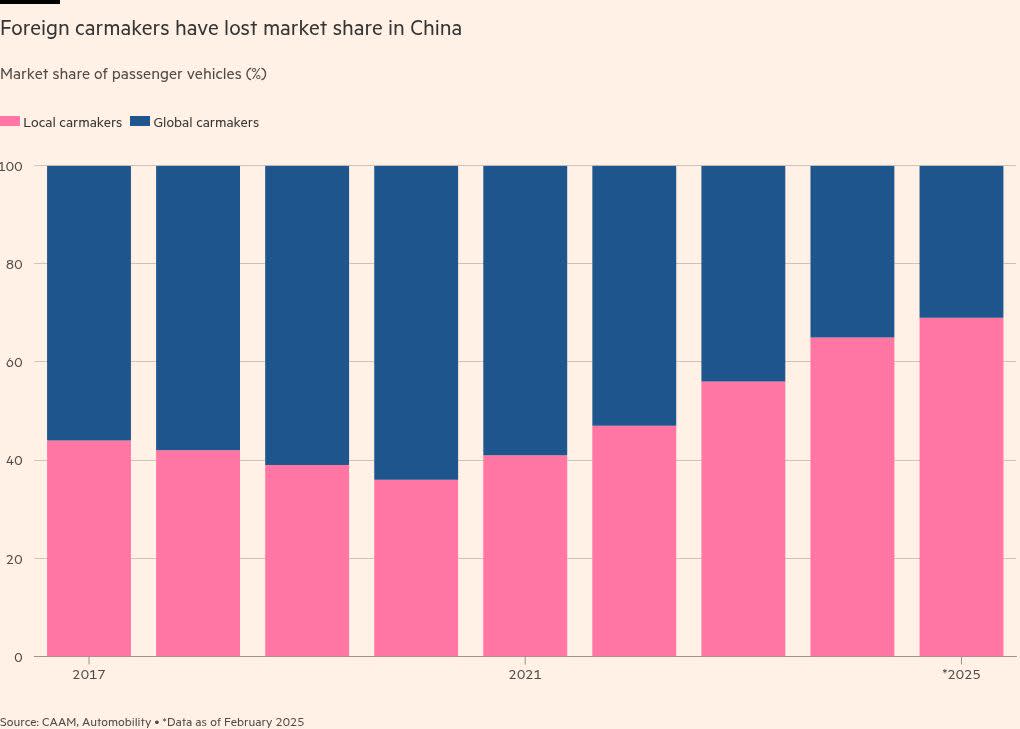This article is an on-site version of our FirstFT newsletter. Subscribers can sign up to our Asia, Europe/Africa or Americas edition to get the newsletter delivered every weekday morning. Explore all of our newsletters here
Good morning and welcome back to FirstFT Asia. In today’s newsletter:
China pulls back from US private equity investments
CATL’s battery breakthrough
The legacy of Pope Francis
Chinese state-backed funds are cutting off new investment in US private equity, according to several people familiar with the situation, in the latest salvo against President Donald Trump’s trade war.
What to know: State-backed funds have been pulling back from investing in the funds of US-headquartered private capital firms in recent weeks in response to pressure from the Chinese government, according to people with knowledge of the matter. Chinese investors would no longer make new fund commitments to US firms, the people said. One added that some were backing out of allocations they had been planning to make, in cases where they had not yet made a final commitment.
Why Chinese funds are pulling back: Multiple buyout executives said Chinese investors had changed their approach to US private equity since the trade war began. China has borne the brunt of US tariffs announced in the past three weeks that threaten to significantly curtail trade between the world’s two biggest economies. Trump has imposed new tariffs of up to 145 per cent on Chinese exports and Beijing has retaliated with 125 per cent tariffs.
Why it matters: In recent decades, Chinese sovereign wealth funds have poured billions of dollars into many of the largest US private capital groups including Blackstone, TPG and Carlyle Group. Top industry executives told the FT that the fallout from Trump’s trade war was prompting some evaluation of where to invest. “There definitely are questions from global investors and clients about what’s happening here,” Blackstone president Jonathan Gray said on an earnings call last week.
US-China trade war: Beijing has warned it will retaliate against countries that negotiate trade deals with the US “at the expense of China’s interests”.
Opinion: Ruchir Sharma explains how the trade war will reorder the global economy — not burn it down.
Here’s what else we’re keeping tabs on today:
Economic data: South Korea publishes March PPI inflation rate data and Hong Kong reports monthly labour market figures.
Global economy: The IMF’s World Economic Outlook is published. Kristalina Georgieva, the managing director of the IMF, warned last week that the fund was preparing to cut growth forecasts amid trade turmoil and market volatility.
China-Kenya ties: Kenyan President William Ruto begins a five-day state visit to China.
Don’t miss the opportunity to join Unhedged’s Robert Armstrong and other FT experts on Wednesday as they discuss how Trump’s policies are shaping markets in a subscriber-only webinar. Register for free.
Five more top stories
1. China’s CATL has unveiled upgraded battery cells it claims can offer faster charging for electric vehicles than its rival BYD. The world’s biggest EV battery maker said yesterday that a new version of its flagship Shenxing battery cell could offer a 520km range from just five minutes of charging time. Read more about CATL’s breakthrough.
2. Wall Street stocks and the dollar tumbled amid mounting uncertainty over the US economy as Trump renewed his attacks on Federal Reserve chair Jay Powell. The dollar fell to a three-year low against a basket of its big trading partners after the US president stepped up his criticism of Powell — whom he called “Mr Too Late” — for not cutting rates.
More US news: Harvard University has sued the Trump administration to block its “unlawful” efforts to freeze more than $3bn in federal funding and increase government oversight of the venerable institution.
3. US and Philippine forces are to conduct their first “full battle test” for fighting together in flashpoints such as Taiwan or the South China Sea. The two countries’ annual Balikatan exercises, which began yesterday, combine elements practised over the past two years — such as targeting enemy ships with missiles from shore or protecting islands from attack — into a war scenario under realistic conditions.
4. The US Federal Trade Commission has sued ride-hailing app Uber, saying it made “false or misleading” claims about its subscription service. The case signals that the Trump administration will continue to clamp down on Big Tech groups despite recent overtures made by executives in the industry.
5. Crypto casino takings have soared to tens of billions of dollars a year, new data showed, as gamblers bypassed blocks in their home countries to bet on unregulated offshore platforms. Despite being illegal in most countries, wagers paid in cryptocurrency last year generated $81.4bn in gross gaming revenue — a fivefold rise since 2022.
Obituary: Pope Francis, 1936-2025

The reign of Pope Francis, who has died at the age of 88, will be remembered for ruthless power struggles and acrimonious doctrinal disputes between liberals and conservatives that were fought at the highest levels of the Vatican and the worldwide Roman Catholic Church.
We’re also reading . . .
Chart of the day
Western carmakers will fight back against domestic rivals in China at this week’s Shanghai auto show, launching new software and intelligence capabilities in vehicles produced with local partners as they attempt a comeback in the world’s largest car market.
Take a break from the news
Donald Trump seems to be having a big impact on a small ski village in the Swiss Alps. Find out why beautiful Andermatt has seen such a huge surge in property demand from US buyers.



